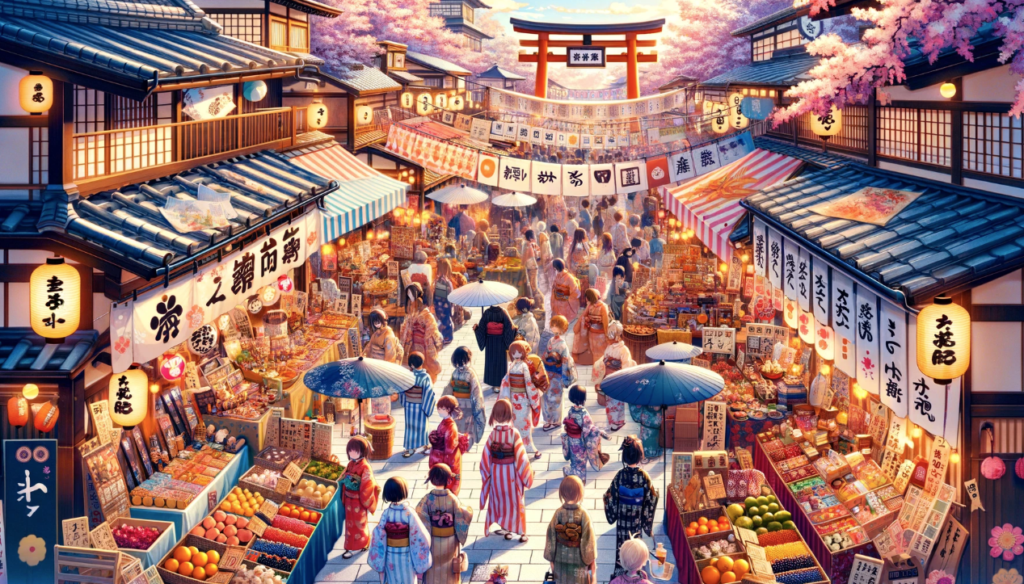
Lesson 55 Seasonal Sales and Festivals
Topic Question: How do seasonal sales and festivals in Japan offer unique shopping experiences?
No. 1: Introduction– First, try answering the question yourself.
The instructor will provide advice on vocabulary, grammar, and expression corrections.
Sample Answer – Let’s read aloud. Instructor will check your pronunciation and accent.
In Japan, seasonal sales and festivals not only reflect the country’s rich culture and traditions but also offer unique and exciting shopping experiences. These events are characterized by their limited-time offers, special discounts, and exclusive merchandise that attract both locals and tourists alike. For example, New Year sales, known as “Fukubukuro,” involve stores selling mystery bags filled with unknown items at significantly reduced prices. Similarly, seasonal festivals like Sakura (cherry blossom) festivals in spring or Autumn Leaf festivals in fall feature stalls selling themed goods, local foods, and crafts that celebrate the beauty of the season. These shopping experiences are further enhanced by the festive atmosphere, with decorations, traditional music, and performances, making them a must-visit for anyone looking to immerse themselves in Japanese culture and find unique items.
No. 2: Vocabulary Building- 5 Words to Learn and Their Meanings
Pronounce the Words Correctly (Pronunciation Training) + Make Sentences Using the Words Instantly
- Fukubukuro (福袋): A Japanese New Year custom where merchants make grab bags filled with unknown random contents and sell them for a substantial discount.
“The excitement of opening a fukubukuro is unparalleled, as it offers shoppers the thrill of surprise along with great value.”
- Themed goods (テーマ商品, tēma shōhin): Products that are designed around a particular theme or concept.
“Seasonal festivals often feature stalls with themed goods, from sakura-patterned items in spring to autumn leaf decorations in fall.”
- Crafts (工芸品, kōgeihin): Items made by hand, which may be functional or decorative.
“Local crafts sold during festivals offer a glimpse into the region’s cultural heritage and artisanal skills.”
- Festive atmosphere (祭りの雰囲気, matsuri no fun’iki): The lively and celebratory mood associated with festivals and special occasions.
“The festive atmosphere at these events makes shopping an enjoyable and memorable experience.”
- Unique items (ユニークなアイテム, yunīku na aitemu): Products that are distinctive and not commonly found elsewhere.
“Tourists flock to seasonal sales and festivals in Japan in search of unique items that serve as souvenirs and gifts.”
No. 3: Key Idiom and Example Sentences
“Once in a blue moon” – This phrase refers to an event that happens very rarely.
“Finding such unique items outside of Japan’s seasonal sales and festivals happens only once in a blue moon.”
“Seasonal festivals offer the opportunity to purchase rare crafts and goods that are available only once in a blue moon.”
No. 4: Discussion and Exchange of Opinions on the Sample Answer
Instructor: How do these seasonal sales and festivals contribute to the local economy and tourism in Japan?
Student: [Opinions of students]
No. 5: Free Discussion on the Topic
Let’s explore how the tradition of seasonal sales and festivals has evolved in Japan. How have modern trends and international influences shaped these events? Discuss the balance between commercialization and the preservation of tradition in these festivals. Additionally, consider the role of digital marketing and online sales in promoting these events, especially in reaching a global audience. How can Japan continue to offer unique shopping experiences that attract tourists while ensuring the sustainability and cultural integrity of these festivals? What future trends might we expect in the landsca







